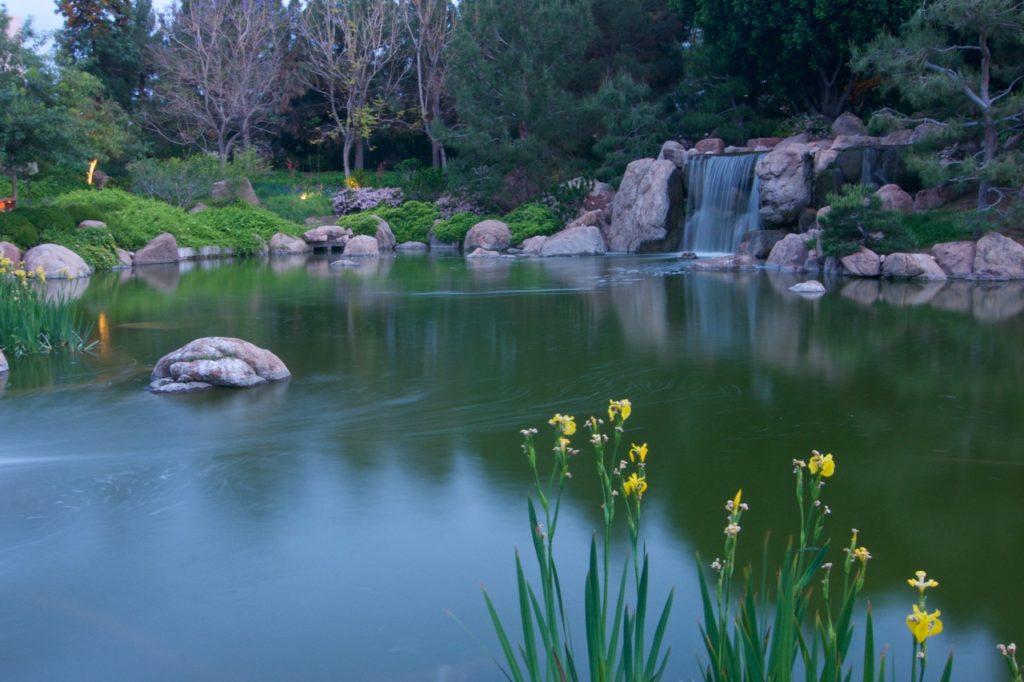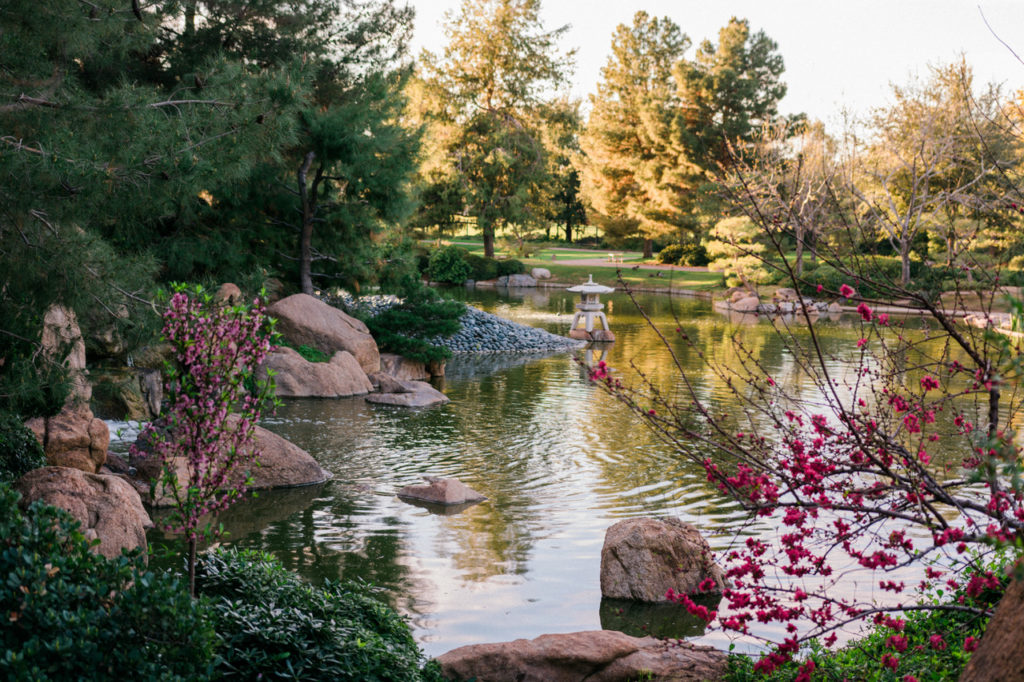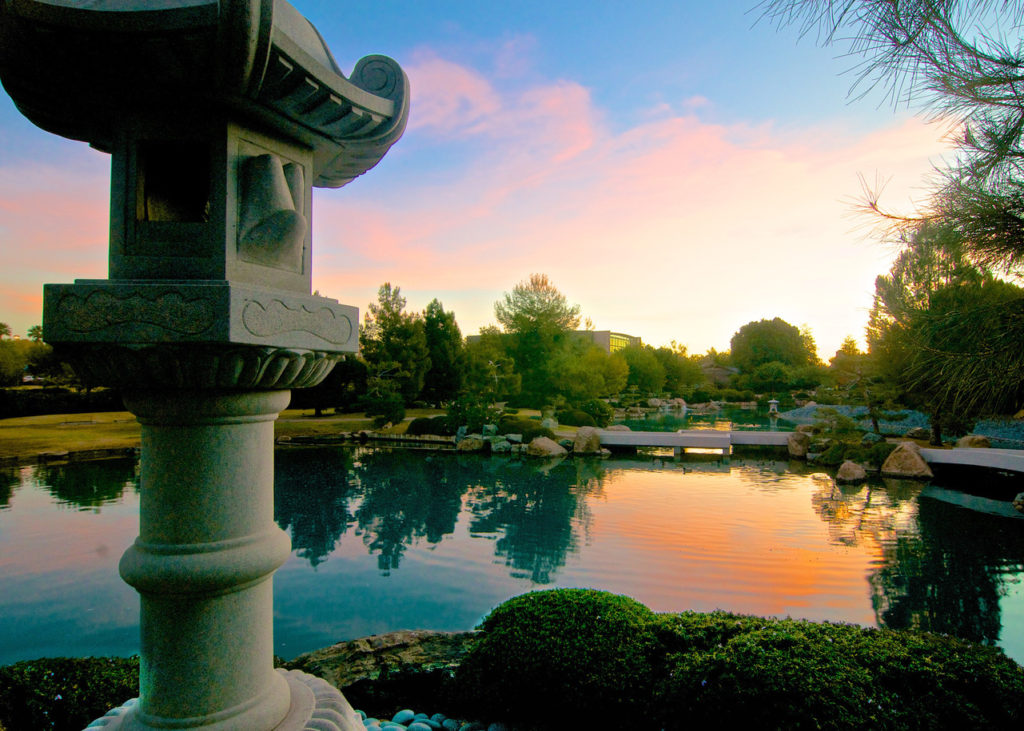Ro Ho En

Writer Fadi Sitto
Photography Courtesy of George Namamura, Bob Link and Airi Katsuta
[dropcap]T[/dropcap]here’s something poetic, romantic and therapeutic about a garden, and this is especially amplified when it’s a Japanese garden.
In the middle of high-rise condos, sounds of construction cranes and the constant hurried pace of a modern city’s hustle and bustle, you’ll find the Japanese Friendship Garden, the most peaceful place in Phoenix.
Located on 3rd Avenue, two blocks north of Roosevelt Street in Downtown Phoenix, the Ro Ho En Japanese Friendship Garden boasts over 3.5 acres of spectacular serene green space. The tranquil and meticulously landscaped setting features a koi pond with hundreds of colorful fish, a softly roaring 12-foot waterfall and a tea garden with an authentic and functional Japanese teahouse.
Ro Ho En is a combination of three Japanese words. Ro means “heron,” a bird symbol of Himeji City. Ho is the Japanese word for the mythical phoenix bird. En means “garden.”
Wandering along its peaceful paths, it’s difficult to ignore the joyful, harkening sounds of the flowing streams through over 1,500 tons of rock. The handpicked stones are from the quarries near Congress, Arizona, and they shape and line the streambeds, walking paths and main garden waterfall. The backbone of a true Japanese garden is highlighted by stones, and is the foundation for its greenery.
Showcasing more than 50 varieties of plants, the original designers of the Phoenix Japanese Friendship Garden purposely chose plant life that can adapt and withstand elements of the Sonoran Desert.
The unique shared cultural vision of this garden came to life in November 1976 when Himeji, Japan became a Phoenix sister city. Himeji is one of Phoenix’s 10 sister cities around the world today.
Phoenix and Himeji participate in business, cultural and educational exchanges that promote mutual goodwill. The Japanese Friendship Garden is a non-profit organization in partnership with the City of Phoenix Parks and Recreation Department.
The mayor of Himeji wanted to build and strengthen the relationship between the two cities, hence the Friendship Garden.
The best of the best landscape architects from Himeji, Japan have made numerous trips to Phoenix over the years to contribute to this garden project. Their expertise in Japanese-style architecture and Japanese flora are featured throughout the garden.
Stepping foot onto the immaculately kept garden grounds, it is nearly impossible to frown or be in a bad mood. The garden contains nature’s spell, only allowing for breath, relaxation and smiles.
“I tell people to not bring any worries to this garden. Leave them behind and focus on the moment,” says Reiko Reavis, executive director of the Japanese Friendship Garden.
She’s been at the gardens for over 20 years. Reiko is originally from Kyoto, Japan, known as the mecca for Japanese gardens like the one here in Phoenix.
The garden is not designed in a straight line; it’s designed to encourage visitors to walk and explore—to discover something new just around each corner. The garden is a masterpiece of strategic natural design.
Reiko is proud of sharing her culture with the people of Phoenix. She says, “our garden is very authentic, it really is Japan in the center of Phoenix, and the only difference is the climate. We are a big part of the arts district here in downtown. The garden is a living art.”
In keeping the promise to collaborate with the City of Phoenix and their neighborhood, the Japanese Friendship Garden also stays open during the monthly First Friday Art Walk. The garden graciously hosts live music, art and other local experiences.
Reiko’s kindness is as alive and infectious as the garden she oversees. Every tree, shrub and bend of the branches here has meaning. Exquisitely maintained, artisan-sculpted trees and vegetation that seem to shape themselves, a variety of breathtaking plants and flowers surround the magical koi pond.
The person responsible for this stunning cultivated gardening is Ben Schrepf. Few people love what they do as much as Ben; you can see it in his eyes and hear it in his voice.
Ben does an extraordinary job of adapting the Sonoran Desert landscape within the Japanese setting.
“It’s a labor of love,” he says, though he doesn’t describe his job as labor at all. He has worked in horticulture for over 20 years and traveled to Japan to heighten his craft. Ben knows his Japan-style gardens.
One of the experiences highlighted at the gardens is the tea ceremony. A proper Japanese tea ceremony is called chanoyu, sado, or simply ocha. It’s a choreographed traditional ritual of preparing and serving matcha with traditional Japanese sweets. Ceremonies here at the Japanese Garden in Phoenix are presented by Tanko Kai tea group, who wear beautiful kimonos in the teahouse.
Ceremony guests are met at the entry gate and guided to the teahouse by a docent who explains the intricacies about this popular garden attraction. As we walk through the authentic bamboo gate to the teahouse, we step back in time. The simplicity and rustic build of the teahouse is the key to a proper tea garden and ceremony.
Upon entering, visitors are led to a special water basin to symbolically purify before entering the house. There is a respect for each detail. The delightful smell of cedar welcomes them in, and a sense of gratitude fills the air.
Matcha tea, a strong and earthy tea, is prepared for the ceremony and placed in a Japanese tea bowl. The host creates froth with a bamboo whisk.
Preparing tea in this ceremony means pouring all one’s attention into the predefined movements. The entire process is not really about drinking the tea; it’s about aesthetics and preparing a vessel of tea from one’s heart.
The traditional host of the ceremony always considers the guests with every movement, action and gesture. Even the placement of utensils is considered from the guests’ viewpoint. It is all part of sharing another culture—another beautiful perspective.
Sometimes a simple late autumn stroll in a downtown garden can change your life. Sometimes, it simply makes your day better.
Japanese Friendship Garden of Phoenix
October through May | Tuesday through Sunday, 10 a.m.–4 p.m. | 1125 N. 3rd Ave., Phoenix
$7 adults; $6 seniors; $5 students/military; Free for children under 6 | 602-291-9209 | japanesefriendshipgarden.org




